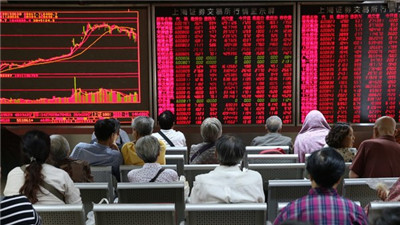(单词翻译:单击)
Financial history may not be poetry, but the pattern of booms and busts has a certain rhythm. It is rare, though, that it matches quite so well as two tech bubbles separated by 15 years, those of China today and the Nasdaq in 2000.
金融史或许不是诗歌,但其繁荣和萧条却遵循着某种韵律。不过,像下面这种如此“押韵”的情况还不多:这是两个科技泡沫,彼此相差15年,其中一个是目前的中国股市,另一个是2000年的纳斯达克(Nasdaq)。
It is not just that both sped up as they inflated, or that private investors piled in, or that money was easy. These features are common to bubbles across the centuries. Both had a wave of IPOs as companies tried to take advantage of seemingly insatiable demand for overvalued stocks, too, but high prices always generate their own supply.

之所以这么说,不仅是因为这两个股市都在膨胀过程中加速上涨、私人投资者都大举涌入、资金都非常宽裕——这些都是几个世纪以来历次泡沫的共同特点——而且还因为这两个股市都出现了首次公开发行(IPO)浪潮。在这股浪潮中,企业试图从人们对估值过高股票的貌似无止境的需求中渔利,但股价走高却总是引起追涨。
Such a coincidence should not matter. But the pattern of the rise and fall does matter, and is common to lots of bubbles: an accelerating boom punctuated by big drops, with sharply higher volatility after the bust as hope and fear intensify. Broadly speaking, the further prices move from measures of value, the more they trade on pure sentiment — and so the more the patterns are likely to repeat, human nature being more or less constant.
这种巧合应该不重要。但其涨跌模式却真的很重要,而且与很多泡沫的涨跌模式都相同:加速上涨被暴跌打断,暴跌后波动性剧烈上升,因为希望和恐惧都在加剧。总的来说,股票的价格越背离价值指标,其交易就越基于纯粹的情绪,模式重演的几率也就越大(假定人性基本不变)。
Still, there are big differences. In the main, Chinese domestic stocks are nowhere near as expensive as the Nasdaq was at its peak (although the tech-heavy ChiNext median stock is a pricey 51 times estimated earnings, and its two largest more than 100 times). China’s authorities have stepped in more quickly than in the US, too, with monetary easing, newspaper articles talking up shares and yesterday, a cut in stock exchange transaction fees.
然而,两者之间仍存在巨大的不同。大体而言,中国国内股票远不如峰值水平的纳斯达克那样昂贵(尽管科技股云集的中国创业板(ChiNext)的股票的预期市盈率中值高达51倍、而且两只市值最大的股票的预期市盈率超过100倍)。中国政府出手干预的速度也快于美国,干预手段包括放松货币政策、利用报纸文章托市,而且昨日还下调了股票交易费用。
Even after a fall of a quarter, by Tuesday’s low, China’s stocks face further risks. The heavy use of margin finance could lead to a downward spiral of margin calls and forced selling. Extraordinary daily price swings make shares look even less attractive, with 5 per cent moves in one direction or the other, and sometimes both, becoming normal.
尽管周二的低点相对不久前的高点已跌去四分之一,中国股市仍面临进一步的风险。融资交易的大量使用可能导致追缴保证金和强制平仓的恶性循环。异乎寻常的盘中价格震荡,降低了股票的吸引力,上涨或下跌5%(而且有时是涨跌都这么大幅度)变成了家常便饭。
Most importantly, the loss of upward momentum has eliminated the main reason for buying shares. If there are no greater fools to sell to, shares have to trade on fundamental value — and bargain hunters are unlikely to step in to offer support at anywhere near these valuations.
最重要的是,失去上涨势头使得购买股票的主要理由不复存在。如果没有更大的傻瓜来接盘,股票只能根据基本面价值交易,逢低吸纳者不太可能在估值如此之高时入场提供支撑。


